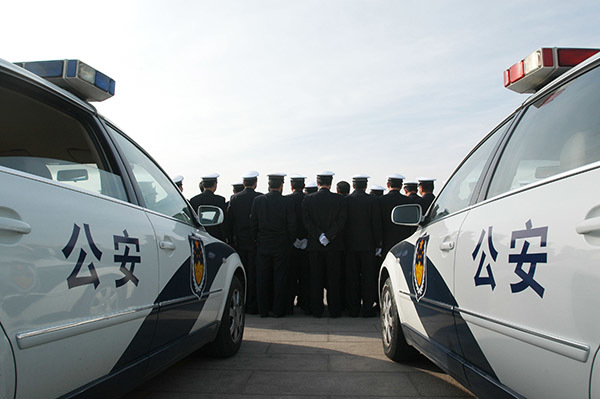Illustration of CCP hackers. (AI-generated image)
[People News] The Chinese Communist Party (CCP) has recently stepped up its public efforts to monitor online speech and further regulate the VPN industry. Both domestic internet service providers (ISPs) and “airport VPN” users (providers of commercial VPN access) have become key targets of surveillance. At the same time, the CCP has widely deployed AI technologies behind mainstream social media platforms like WeChat, QQ, and Douyin, scanning user chats, voice messages, images, and more with deep recognition systems. Many netizens have pointed out that these measures expose the CCP’s fear of people learning the truth. Once the people know the truth, they will abandon the CCP and dismantle the regime.
According to a report by The Epoch Times, several sources have revealed that the CCP’s regulation of VPNs has become increasingly proactive and technologically advanced. Interestingly, some foreign visitors to China are being offered "exclusive VPNs" upon arrival, suggesting a dual-track strategy of censorship and data control, which has drawn international attention.
Currently, it’s estimated that there are 30 to 40 million people in China who use VPNs to bypass internet censorship and access the global web.
On July 24, multiple users on domestic and overseas social media platforms reported that, since May, the crackdown on domestic VPN services has intensified. Sources also told The Epoch Times that technicians working under China’s Cyberspace Administration have begun proactively purchasing commercial VPN services to identify and trace the IP addresses of VPN nodes. These are then reported to Chinese ISPs to track down providers and customers.
Once a VPN server is confirmed to be used for circumvention, the associated node is quickly shut down, and users may be subject to investigation. Multiple VPN “airport” operators reported that this precise targeting strategy has left them under continuous pressure and blockades.
An anonymous VPN service provider said helplessly, “Recently, the Great Firewall (GFW) has been very active. Around 4 p.m. each day, outbound IPs are blocked in batches, like scheduled power cuts. If this continues, domestic VPN tunnels may be entirely eradicated. New tunnelling protocols are still being tested. Most people can only wait and see how the tech community counters the GFW.”
Li Wen (alias), a programmer at a Chinese internet company, revealed in an interview that both domestic VPNs and airport-provided services may carry hidden risks. He explained, “Developing VPNs in China requires approval from the Ministry of Public Security and registration with the Cyberspace Administration. Many so-called VPNs are actually surveillance tools. They can collect information and browsing records from your phone and upload them to developers for analysis. If your data contains sensitive content, the consequences can be dire.”
Li also said that authorities in Beijing analyze huge amounts of user data from domestic VPN companies every day. Some of these companies operate from overseas, but their work focuses on two main areas: 1. Content related to political stability, including petitioning, rights defence, and criticism of CCP leaders. 2. Information in science, technology, and commerce, including chip development, foreign corporate activities, and international business cooperation.
Meanwhile, the CCP adopts a “different standard” for foreigners using VPNs. A Korean-Chinese woman, Ms. Chen, said that upon arriving at Shanghai Pudong International Airport, ground staff offered her a phone SIM card and VPN installation service to ensure unhindered access to foreign websites.
Some YouTube users have even openly promoted certain VPNs as the “only ones that operate stably and at high speed in China,” and have posted videos showing how they work inside the country.
As the Great Firewall becomes more sophisticated, a bizarre dual reality has emerged in China’s cyberspace: domestic users live in fear, while foreigners are granted “special access.” This unequal treatment has caused frustration among Chinese netizens.
Experts warn that under the CCP’s harsh censorship and high-pressure tactics, public access to VPNs will become increasingly limited. The regime is entering a deeper phase of what it calls “data governance,” which in reality means tighter digital control.
A reader of Renminbao named “Qin Yue” commented: “These measures reveal how afraid the CCP is of the public discovering the truth. Once people know the truth and see through the lies that uphold the CCP’s image as ‘great, glorious, and correct’ or a ‘saviour,’ they will realise the CCP is in fact a disaster for humanity, and the people will abandon and dismantle it.”
How Can You Bypass the Great Firewall to Access Free Information?
Gong Kai, who currently lives in North America, spoke at a rally in March calling for the dismantling of the Great Firewall. He said that when he was in mainland China, he often used Freegate, a circumvention tool, to access foreign websites and bypass censorship. He also shared useful tips for safely accessing the open internet from within China:
-
Distribute Freegate Widely – People overseas should compress and package Freegate software and send it to people in China to help them access the truth. It can be downloaded from dongtaiwang.com.
-
Use Xunlei (Thunder) – Search “FQ” (the pinyin abbreviation for “circumventing the wall”) on this download manager to find circumvention tools.
-
Keep Multiple Versions – Always keep several versions of VPN software. If one gets blocked, others may still work.
-
International SIM Cards – Buy mobile SIM cards that support international roaming and activate them abroad, then send them to China or bring them along. Make sure they have enough data. You can also send phones with virtual SIM capabilities and help recharge them from overseas.
-
Avoid Domestic Antivirus Apps – Chinese antivirus programs like 360 Safe Guard should not be installed. Always exit WeChat before using any circumvention software.
-
Beware Fake VPN Apps – Many “VPN” apps available in Chinese app stores are actually CCP honeypots for surveillance. Avoid using them.
-
Adjust iPhone Settings – Turn off iCloud, change your iPhone’s region to the U.S. instead of China. Otherwise, your data may be stored in the CCP-controlled “iCloud China” servers. Also, avoid Chinese input methods like Sogou, which can steal personal information.
Guan Wenwei, a VPN software provider now based in the Netherlands, said that VPN usage in China spikes significantly during major events. Even people who normally don’t circumvent the firewall start doing so. He also recommended Freegate, a tool developed by Falun Gong practitioners, which remains free to use. It has been heavily targeted by the CCP because it exposes the regime’s corruption, internal power struggles, and the suffering of the people.
In coastal regions of China, even some government office computers use Freegate or similar software like UltraSurf to access The Epoch Times.
Bill Xia, president of Dynamic Internet Technology (DIT), stated that Freegate is still widely used. Though the CCP intensifies its efforts to block it during sensitive times, Freegate can deploy multiple resources and servers, making it difficult to fully suppress.
Zhong Shan, an engineer from China now in Silicon Valley, said Freegate is an excellent tool. He first read The Nine Commentaries on the Communist Party using Freegate and continues to use it to access overseas content and study English. The tool has helped him understand the real situation in China.
Guan Wenwei concluded by saying that whenever the CCP is on the verge of collapse, it cranks up its propaganda machine to paint a rosy picture. With no alternative sources of information, Chinese citizens are trapped in a one-voice echo chamber. When the firewall finally falls, and the Chinese people—including young nationalists—learn the truth, will they still stand with the Party? △











News magazine bootstrap themes!
I like this themes, fast loading and look profesional
Thank you Carlos!
You're welcome!
Please support me with give positive rating!
Yes Sure!